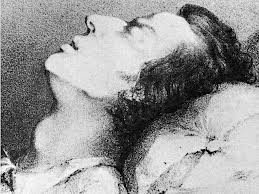When my mother died a little over a year ago I was 3,000 miles away. She died unexpectedly one night in her sleep, we believe, at her home in Massachusetts. I was in Oregon, scheduled to visit her the following week. It sounds lovely to die in one’s sleep (I hope I go that way), but she died alone, at considerable distance from her three daughters. No one was holding her hand, reminding her she was loved, telling her it was okay to go. We never had a chance to say goodbye, and her body was not discovered for close to three days so when we arrived it was so decomposed we were only allowed to view it from afar.
My father’s death, too, happened without me present. He died a number of years ago of leukemia, after a late March ice storm that took down branches and entire trees on the property, a loss that broke his heart. My mother was with him when he died, but my sisters and I were not. Though he was sick, he died months before anyone expected him to, and the onset of death was sudden. My husband and I had canceled a scheduled trip to visit, on my mother’s urging, because of the storm she claimed, though now I think she knew the end was near and wanted to shepherd him through it alone.
With both deaths I missed being part of the passage, missed bearing witness. I missed that combination of pain and tenderness that I saw exchanged between patients and their families when I was a hospice volunteer. I have friends who have kept vigil at the bedsides of their dying parents. For some it has been a sacred ritual. One friend read to her mother chapters of the manuscript she was finishing, and her mother gave her suggestions. Merely imagining that scene—one that could never have happened with me and my mother—brings me to tears.
There are probably as many ways to die as there are to live. Both my parents were private people, stiff upper lip New Englanders, and I often think they preferred dying with few people—or no people in my mother’s case—around. At any rate, it was with some surprise that I read the very moving article about Nora Ephron’s death, written by her son Jacob Bernstein (NYTimesMagazine, March 10, 2013). During her decline he was present, day in and day out, witnessing everything. He saw her change from a witty dynamic Life Force to a woman who was losing hair, sassiness, dignity. He would have preferred it to be otherwise.
He writes: “People who live thousands of miles from their parents often express regret at not being able to say goodbye, or about having spent too little time with them during their final days. But being there every day, as I was, produced its own kind of sorrow. It wasn’t just the big things we were avoiding saying (although there were certainly some of these). It was the sadness of having run out of news to deliver, gossip to report, new books and movies to discuss.”
And I see his point. Who wants to witness the ebbing of life in your own mother? Perhaps he has a harder legacy than mine. Mostly I am free to imagine my mother’s death as a peaceful night-time vanishing without countervailing images.
The fact is there is no way to get on top of death, no way to feel it is under your control and happening as you would like it to happen. It often—usually—ambushes us. As Nora herself said in I Feel Bad About My Neck: “Death is a sniper. It strikes people you love, people you like, people you know, it’s everywhere. You could be next. But then you turn out not to be. But then again you could be.”
Perhaps what Jacob and I both feel, coming from our opposite experiences, is simply another manifestation of the grief, the roar of protest against that most primal of losses.

Add Comment